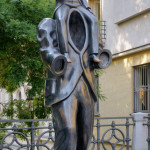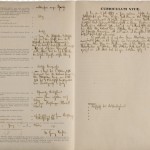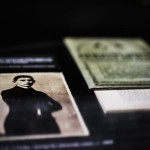The model employee life of Franz Kafka
«I am at Assicurazioni Generali, but I hope to sit down one day in the chairs of very distant countries, to look at the office windows on sugar cane fields or Muslim cemeteries, the insurance business interests me a lot, even if for now my work is sad». Words from a letter to a pen friend and lover named Hedwig Weiler, dated October 8, 1907. The writer is a freshly recruited employee in the back-up post in the Prague agency of Generali: Franz Kafka. In his early twenties, the man today considered one of the greatest authors of European twentieth century literature, discovered in these young confidences the trends of a tormented soul, caught between the yearning of the elsewhere and the sense of a duty that is identified with the clerical occupation.
 An ambivalent character that of Kafka, who oscillated between the meticulous and the animalistic; he who divided his life between «the eight, nine endless hours of work» and those to devour outside the office, «like a ferocious beast». The human ambiguity of this author of guilt and of the absurd, lies in this double identity: a “nocturnal” one, which will express in a great literature capable of exploring the anxieties of an era and which will be known only years after his death, and a “diurnal” one, that of the diligent insurance broker, both shrewd, and skilled. After training in law and a brief experience in a law firm, Kafka began his career in the insurance sector in the prestigious Prague office of one of the financial columns of the Austro-Hungarian Empire.
An ambivalent character that of Kafka, who oscillated between the meticulous and the animalistic; he who divided his life between «the eight, nine endless hours of work» and those to devour outside the office, «like a ferocious beast». The human ambiguity of this author of guilt and of the absurd, lies in this double identity: a “nocturnal” one, which will express in a great literature capable of exploring the anxieties of an era and which will be known only years after his death, and a “diurnal” one, that of the diligent insurance broker, both shrewd, and skilled. After training in law and a brief experience in a law firm, Kafka began his career in the insurance sector in the prestigious Prague office of one of the financial columns of the Austro-Hungarian Empire.
The headquarters of Generali, a group from Trieste founded in 1831, at that time occupied the sumptuous Neobaroque building of the late 19th century, which we still find today in the corner between Jindřišská street and Wenceslas Square. A modern and prestigious building in the “noble Empire” which was the capital of the Kingdom of Bohemia between the 19th and 20th centuries. A city where a considerable portion of the intellectuals and the bourgeoisie spoke German, like the author, who was born in a family of Jewish merchants. However, if it is certain that the work and figure of Kafka are closely linked with the Golden City, today, thanks to some documents that emerged from the archives of the insurance group, we know that the company was planning to train the young man for work abroad. Kafka, on his part, imagined a career away from his hometown, in Italy, at the headquarters of Generali. In a letter dated November 1907, the author wrote «I am studying Italian right now because I think I will probably be sent to Trieste». However, this project would never occur, and the young auxiliary was to leave his post on July 15, 1908, about ten months after being hired, justifying his resignation with health reasons.
In reality, at that time, the serious health problems that eventually led to his death had not yet occurred. From what can be learned from his correspondence from that 1907, the reasons for the resignation were probably something else. Kafka in fact was particularly unhappy also because of his working hours, from 8 to 18 o’clock, which made it extremely difficult to focus on writing, an activity that was increasingly taking on importance in his life. «I have a post with a tiny salary of 80 crowns and eight-nine endless hours of work», are the words with which he expressed his dissatisfaction in a letter to Hedwig Weiler of 1907. Today we know that precisely during that year, 1907, Kafka wrote Wedding preparations in the country (in German Hochzeitsvorbereitungen auf dem Lande), published posthumously by his friend Max Brod. The first works by Kafka that were published date back to 1908, eight stories which appeared in the first issue of the literary journal Hyperion under the title Betrachtung (Contemplation).
In the Generali Historical Archives, there are other precious documents that help shed light on these lesser-known moments in the author’s life. Peeking through the file of this special employee you find his CV, in which Kafka mentions having studied at the Altstädter deutsches Staatsgymnasium (the German State School of the Old City), of having graduated in Law and having worked in a law firm at the Altstädter Ring (Old Town Square). In a curious attached document, the candidate also claimed to be able to speak German, Czech, French and English, but to be «out of practice» in the last two languages. What is also interesting is the medical report that defines him as «delicate but healthy», suitable, in short, for recruitment in the group. In addition to the curiosity for private detail, these documents, like many of his letters, have a concrete historical importance for trying to understand the complex personality of the author, whose writing has been able to express the ambiguous feelings of loss that cross society and the European man at the beginning of the twentieth century.
Giuseppe Stefani, publisher of the Bollettino of the Generali Group, used these documents for the preparation of two important articles published in the company’s magazine: «Franz Kafka Generali employee», of 1952, and «A letter from Franz Kafka to his head office at Assicurazioni Generali», from 1954. It is important to underline that Stefani writes in direct contact with an exceptional source, Max Brod, a friend and confidant of Kafka. It will be Brod, who fled in 1939 from Prague to Tel Aviv loaded with his friend’s manuscripts to decide, against the last wishes of Kafka, who died at the age of 40 on 3 June 1924, to publish, posthumously, much of the work of Prague writer. Stories such as The Castle or The Trial would have never seen the light had it not been for Brod’s willingness to divulge these fundamental texts. The author of Metamorphosis, in his lifetime, published little and did not experience literary fame: it is no exaggeration to say that Kafka was a good insurer rather than a lauded writer.
After the experience with Generali, he entered the Institute of Insurance against workplace accidents for the Kingdom of Bohemia and stayed there for almost fifteen years. A place that he would leave only two years before his premature death. There are still the many letters that Kafka would write throughout his life to friends, lovers, and in that highly well-known Letter to His Father, which helps us understand his conflictual relationship with the office work. If on one hand it seemed that it was a burden on him, stealing his time as a writer which animated him deeply, on the other hand, we know that his rigor and ability would lead him into making a career in the insurance sector. In his own way, Kafka had to be proud of his job, to the extent that he was willing to send certain technical documents he wrote for the company to friends. A meticulous and dedicated employee, he wrote information manuals for factories to avoid accidents, and tried to make sure that most of the workers were ensured against accidents at the factory, a high-risk workplace at the time. Although it is difficult to say to what extent the insurance broker Kafka influenced or inspired the writer Kafka, it is certain that the biography of the author, progenitor of a long series of epigones, had a double and elusive plot, at first sight illogical, a little absurd. He who as a strong theme of his writing, had the frustrated attempts of man opposing the system, the bureaucracy, in which in a certain way the diligent clerk had worked: an unusual double life, a bit Kafkaesque in nature.
by Edoardo Malvenuti









